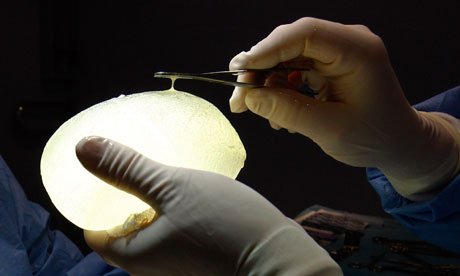
Andrew Lansley, the health secretary, is heading for a confrontation with the private cosmetic surgery clinics embroiled in the faulty breast implant scandal after they refused to comply with what he described as their "moral duty" to offer free surgery to worried women.
Investigations by the Department of Health have found no link to cancer, nor any reason for the routine removal of PIP implants, despite claims in France that they have a high rupture rate. But on Friday, Lansley said the low quality level of the silicone used in the French-made implants meant the NHS would offer free removal for women who were concerned and that private providers were expected to do the same.
Nuffield Health, BMI Hospitals and Spire have agreed to comply, but the government received a stern rebuke from Transform, the self-styled leading cosmetic surgery firm, which refused to agree with Lansley's demands and went on the attack against the government's handling of the scandal. Nigel Robertson, Transform's chief executive, demanded an urgent meeting with Sir Bruce Keogh, the NHS's medical director, in an escalation of the row which is threatening to become a major embarrassment to the government.
Robertson said: "The proposals announced by the Department of Health for the resolution of this situation have done nothing to reduce anxiety levels. We have asked for an urgent meeting with Sir Bruce Keogh to gain clarification of the statement and subsequent comments made in media briefings so that we are best able to plan our response."
Transform, whose turnover last year was £36.2m, is one of four major firms thought to have been involved in 60% of the 40,000 operations in which PIP implants were used. Linia Cosmetic also said it would only replace implants for free when "appropriate", adding: "We find that instead of clarifying the issues, government advice has not been clear and may increase confusion. We believe government is not fully accepting its responsibility and hiding what is essentially a massive regulatory failure."
The other two companies – the Hospital Group and the Harley Medical Group, – failed to return calls on Saturday about their policy on extractions. Callers to a helpline at the Hospital Group, which is owned by American businessman Paul Allen, were told that they would "not necessarily receive free treatment".
Sally Taber, director of the Independent Healthcare Advisory Services, the body representing the private health providers, refused to take questions on the conduct of her members and in a statement offered only free consultations for women who are worried.
Taber, who attacked the health department for its regulation of the industry, said: "All public and private sector surgeons used these [PIP] implants, which were not the cheapest on the market, in good faith with the knowledge that they had been approved by the Department of Health agency, the Medicines and Healthcare products Regulatory Agency. Our current advice to patients is to visit the website of their clinic provider and follow the advice detailed there. Patients can be assured that all of our member organisations are prioritising patient care above all else and all have undertaken to provide consultations without charge for women who would like to consult a surgeon."
Under the proposals announced by Lansley on Friday, the NHS will cover the costs for women who had the implants fitted by the health service and who are anxious to have them removed. It will also remove the implants if the private clinic no longer exists or refuses the patient. It is thought that 95% of women had the operation privately.
Andy Burnham, shadow health secretary, said he believed the government should do more to force all the private health companies to pay for extraction operations. He said: "While we accept the advice the government has given on the basis of evidence they have seen, we are disappointed that they are not providing more help to women affected.
"As a result, thousands of people are left in a difficult situation by this review. The government must appreciate how, for the vast majority of women affected, their statement on Friday was inconclusive. By implication, the suggestion was that the best course of action is to have implants removed. But they provided no practical help to the vast majority of people affected.
"It is an unacceptable state of affairs for any woman now to be left in a position where she is worrying about her health, and has no peace of mind, but is unable to afford to do anything about it. It is not enough for the government to say that the private providers have a 'moral duty' to their patients.
"Many women and their families will have been looking for a much stronger response from the government and will feel left in the lurch by this unsatisfactory statement."
A Department of Health spokesperson said: "Both the health secretary and Sir Bruce Keogh, NHS Medical Director, have been absolutely clear that the NHS will support the removal of PIP implants if the patient has concerns and with her doctor she decides that it is right to do so. We have been explicit that the NHS will help those who are either turned away by an unscrupulous clinic or whose clinic no longer exists."
• This article was amended on 8 January 2012. We added a comment from the Department of Health in the last paragraph.

